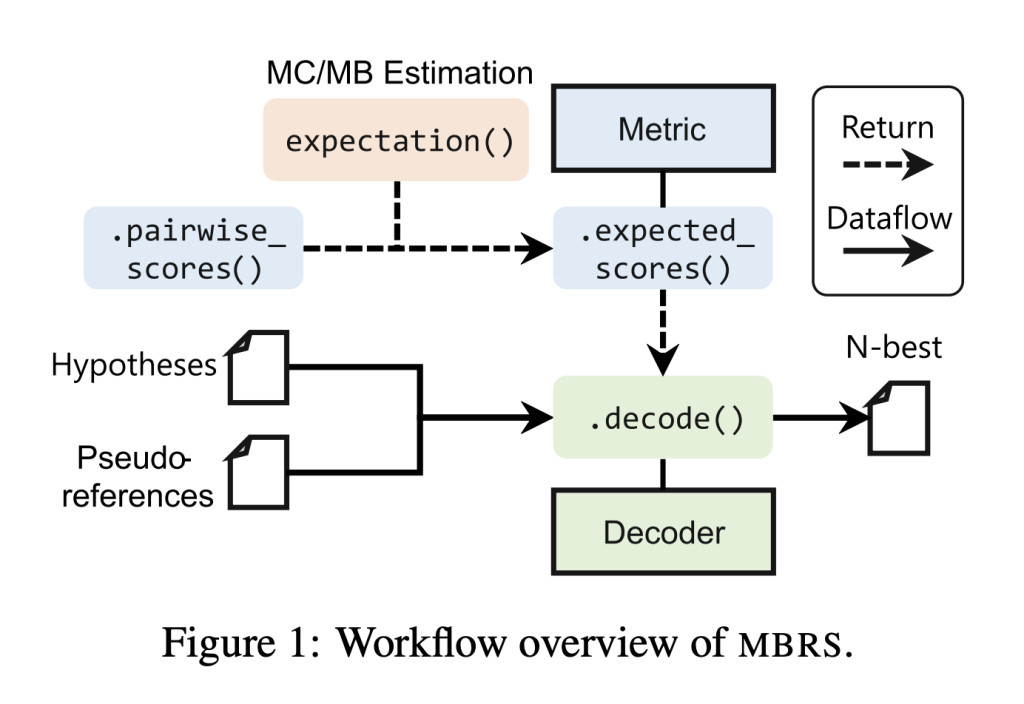Maximum A Posteriori (MAP) decoding is a technique used to estimate the most probable value of an unknown quantity based on observed data and prior knowledge, especially in digital communications and image processing. The effectiveness of MAP decoding depends on the accuracy of the assumed probability model.Â
Researchers from the Nara Institute of Science and Technology address the limitations of conventional maximum a posteriori (MAP) decoding in text generation tasks, particularly the issues arising from the “beam search curse.†This phenomenon occurs when high-probability outputs, generated using MAP decoding, result in low-quality or pathologically flawed text, such as repetitive sequences or input copies. The researchers proposed the use of Minimum Bayes Risk (MBR) decoding, a decision rule that selects outputs based on quality or preference rather than probability, offering a more reliable alternative to MAP decoding in neural text generation.
MAP decoding, often implemented with beam search, is the standard approach in text generation models. However, it frequently results in suboptimal outputs due to reliance on selecting high-probability sequences. Recent research has demonstrated that these high-probability sequences do not always correspond to high-quality text, necessitating alternative approaches like MBR decoding. NAIST introduced MBRS, a new library specifically designed for MBR decoding, which supports a range of metrics and algorithmic variants. MBRS aims to address the need for a comprehensive, flexible, and efficient tool that enables researchers and developers to experiment with and systematically improve MBR decoding methods.
The MBRS library is implemented primarily in Python and PyTorch and offers several key features. It supports various evaluation metrics, including BLEU, TER, chrF, COMET, and BLEURT, which can be used as utility functions in MBR decoding or for N-best list reranking. MBRS allows users to choose between Monte Carlo estimation and model-based estimation for MBR decoding, offering flexibility in the selection of decoding methods. The library is designed with transparency, reproducibility, and extensibility in mind. It includes a code block profiler that measures the time spent on each code block and counts the number of calls, aiding in the identification of performance bottlenecks. Additionally, MBRS provides metadata analysis capabilities, allowing users to analyze the origins of output texts and visualize the decision-making process of MBR decoding. The library’s extensibility is further enhanced by abstract classes that enable the easy customization of metrics and decoders.
In conclusion, the MBRS library addresses the significant shortcomings of traditional MAP decoding by offering a flexible and transparent tool for implementing MBR decoding. By providing various metrics, estimation methods, and algorithmic variants, MBRS enables systematic comparisons and improvements in text generation quality. The library’s design prioritizes transparency and reproducibility, making it a valuable resource for both researchers and developers aiming to enhance the performance of text generation models.
Check out the Paper and GitHub. All credit for this research goes to the researchers of this project. Also, don’t forget to follow us on Twitter and join our Telegram Channel and LinkedIn Group. If you like our work, you will love our newsletter..
Don’t Forget to join our 48k+ ML SubReddit
Find Upcoming AI Webinars here
The post MBRS: A Python Library for Minimum Bayes Risk (MBR) Decoding appeared first on MarkTechPost.
Source: Read MoreÂ

